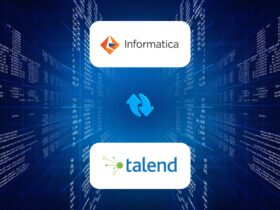GPT-based data engineering accelerators make the working of data more accessible. These accelerators use GPT models to do data tasks faster, fix any issues, and save a lot of time. These accelerators combine information from different sources. One can rely on this information. GPT models change data in simple language and also provide summaries and explanations. They use intelligent language interfaces and make data accessible to more people. Overall, GPT-based data engineering accelerators are very efficient and beneficial for organizations.
GPT-Based Data Engineering Accelerators:
Given below is the list of some of the GPT-based data engineering accelerators.
1. DataGPT
OpenAI developed DataGpt for performing data engineering tasks. Datagpt creates code for data pipelines and transformations. It answers all questions about data and translates data into different formats. It is the first AI-powered conversational data analyst. DataGPT helps businesses to effectively analyze their data by providing important information and in-depth data exploration.
Benefits of DataGPT
- Save Time: DataGPT saves the time of analysts by addressing queries.
- Generate Code: DataGPT creates code for data pipelines and schema definition.
- Cost-effective: DataGpt decreases the overall cost of the analysis of data and also provides information at an affordable price.
- Translate Data: DataGPT works as a translator. It converts between formats like CSV, JSON, and SQL and ensures smooth data integration and manipulation.
- Analysis for every user: DataGPT understands queries and provides detailed answers.
- Freely explore your data: DataGPT allows anyone to freely analyze any aspect of your data with only a few clicks.
- Analyst-grade response: DataGPT carefully analyzes data and does not overlook any important information. It creates precise findings, verifies each segment, and explores funnel analytics.
- Quick insights: DataGPT fastens information creation and allows organizations to make crucial decisions faster.
- Simple and quick setup for data source: DataGPT identifies and recommends the most important metrics and dimensions.
- Performance: DataGPT can address requests 100 times faster than traditional databases and business intelligence tools.
2. Cohere
Cohere helps in building powerful and secure applications and helps in searching, understanding, and translating text. It provides data cleaning, analysis, validation, and abnormality detection. It creates summaries of large datasets and identifies anomalies in data. Its technology is based on transformer architecture. Cohere addresses various tasks such as text generation, classification, summarization, and search. Cohere has high accuracy and performance. It works with different languages and domains. You can use Cohere according to your needs. It allows users to access its language model and powerful functions to build various application scenarios. It also helps in improving self-written content.
Benefits of Cohere:
- Data Cleaning: Cohere finds missing values, abnormalities, and discrepancies in your data and advises how to address them.
- Summarize: Cohere extracts clear and accurate summaries from emails, papers, and articles. In this way, users quickly get the essential information. Cohere generates summaries according to the selected length and style by a user.
- Strong keyword search: Cohere helps organizations to create strong search solutions. Its Embedded model supports around 100 languages and provides accurate results. It supports keyword search in any type of document, such as a web page, PDF, email, or any other format.
- Generate: Cohere creates product descriptions, blog entries, and marketing materials. It uses examples or hints the user gives and keeps the flow and consistency in the text.
- Data Validation: Cohere’s automated validation tools make data accurate and verify format compliance, rule adherence, and potential inconsistencies.
- Classify: Cohere can perform intent recognition, sentiment analysis, customer support routing, and other tasks. It also provides confidence scores and classifies text based on user-defined categories.
- Embed: Using its high-performance method, Cohere can transform any text into a numerical vector for further examination.
- Data Interpretation: Cohere makes important discoveries for practical data exploration and creates summaries of massive datasets.
3. Genie
Genie is open source and flexible and used to create custom data engineering pipelines. It provides ways for organizations to operate, innovate, and strategize. Genei data engineering is a transformative force that offers various benefits to organizations to handle and leverage their data. Genie brings efficiency, scalability, and intelligence and revolutionizes how businesses operate.
Benefits of Genie:
- Adjustment and Personalization: Genie allows you to customize the GPT engine to meet unique requirements. Its behavior can be customized and adjusted based on your data.
- Effective Integration of Data: Genei combines data sources in an open manner and removes all obstacles in decision-making.
- Building Customized Pipelines: Genie can create custom data pipelines and easily integrate GPT’s features into a current data structure.
- Open-source Collaboration: Genie supports developments and innovations in the field of data engineering by fostering a collaborative environment.
- Quicker Processing Rates: By Genie, all the data engineering tasks that used to take a long time can now be completed at much faster rates.
- Improved Data Governance and Quality: Genei prioritizes data quality and ensures that the information used to inform decision-making processes is trustworthy and accurate.
- Scalability for Potential Growth: Genei offers the adaptability to manage significant volumes of data efficiently. Because of its scalability, organizations can adjust to changing data needs.
4. PromptBase
PromptBase focuses on efficient code for data pipelines. It uses GPT’s understanding of data structures and algorithms. PromptBase provides an open market where users can search for and sell prompts suitable with different AI language models. PromptBase allows users to buy prompts designed to produce particular kinds of content. You can also employ creators to create unique prompts with PromptBase. Its methods have the potential to simplify, automate, and make data engineering work more accessible.
Benefits of PromptBase:
- Task Streamlining and Automation: PromptBase produces code for data transformation, loading, and cleaning to reduce manual labor and potential errors.
- Managing data pipeline: PromptBase simplifies the development and administration of complex data pipelines. It facilitates the automation of processes and systems.
- Augmenting Data Quality and Exploration: PromptBase detects anomalies, inconsistencies, or missing values in datasets and prompts engineers to take correct actions.
- Investigating and understanding datasets: PromptBase guides engineers through data analysis, suggesting insights, and identifying correlations.









